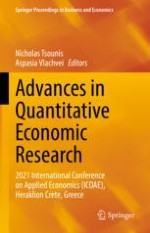2022 | OriginalPaper | Chapter
4. Quantitative Analysis of Corruption Political Factors
Authors : Beáta Mikušová Meričková, Michal Lendvorský, Nikoleta Jakuš Muthová
Published in: Advances in Quantitative Economic Research
Publisher: Springer International Publishing
Activate our intelligent search to find suitable subject content or patents.
Select sections of text to find matching patents with Artificial Intelligence. powered by
Select sections of text to find additional relevant content using AI-assisted search. powered by
